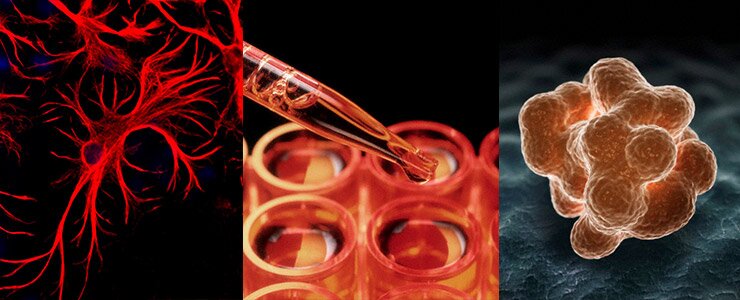In Vitro Cell-based Services Pipeline

We provide a wide range of customized in vitro assays in various cell types including primary cells, immortalized cell lines, stem cells, cancer stem cells, 2D and/or 3D cell cultures to meet the specifications and needs of our clients. The in vitro assays include -
- Cytotoxicity and cell proliferation assays (MTT, SRB, LDH etc.)
- Toxicity assays for hepatocytes, hematopoietic cells, neuronal cells, endothelial cells, smooth muscle cells, fibroblasts, cardiomyocytes, monocytes, T-cells and PBMCs
- Cellular uptake efficiency assay - by fluorescent microscopy and flow cytometry
-
Cell Death Assays- Apoptosis/Necrosis
- Annexin-V/PI assay - by flow cytometry
- Caspase-3/7 assay - by fluorescent microscopy, flow cytometry and RT-qPCR
- Detection of mitochondrial membrane potential - by fluorescent microscopy and flow cytometry
- DNA fragmentation assays: TUNEL assay (by fluorescent microscopy and flow cytometry) and Comet assays
- Quantification of protein markers involved in apoptosis (BAX,Bcl-2, p53, γH2AX, P-AKT, etc.) - by fluorescent microscopy, flow cytometry and RT-qPCR
-
Cell Cycle Analysis
- Using DNA-binding dyes such as PI, 7-AAD, Hoechst 33342 and 33258, DAPI - by flow cytometry
- Analysis of cyclin dependent kinases – by fluorescent microscopy and flow cytometry
-
Functional Cell Stress Assays - by fluorescent microscopy, flow cytometry and RT-qPCR
- ROS formation assay
- Lipid peroxidation assay
- Glutathione depletion assay
- Mitochondrial membrane potential assays
- Hypoxia signaling marker analysis
- Anti-oxidant assays: Copper/zinc-superoxide dismutase (SOD1), manganese-SOD (SOD2), catalase (CAT), glutathione (GSH), glutathione peroxidase (GPX) and GSH reductase (GSR)
- Cell specific marker analysis - by fluorescent microscopy (immunocytochemistry and immunohistochemistry), flow cytometry and RT-qPCR
-
Exclusive Flow Cytometry Services
- Analysis of CD34+ cells and other stem cell markers (Ex: CD13, CD29, CD44, CD73, CD93, CD105, CD146 etc.)
- Analysis of cell surface and intracellular markers in umbilical cord blood samples/PBMCs
- Cell surface marker analysis for cell characterization, and/or for diagnosis and monitoring of haematological malignancies, cancer, infectious diseases and genetic disorders.
- Measurement of G Protein-coupled Receptors (GPCRs) expression for drug discovery
- Measurement of intracellular calcium ions
- Measurement of ligand-receptor interactions
- Detection of circulating endothelial cells and endothelial progenitor cells
- Metabolism Assays: Anti-diabetic assays (glucose uptake assay, α-amylase inhibition assay, α-glucosidase inhibition assay, sucrase inhibition assay), lipids and phospholipids accumulation, LDL uptake etc.
- Inflammation Assays: iNOS activation, NF-κB translocation, COX genes activation, interleukins etc. - by fluorescent microscopy, flow cytometry and RT-qPCR
- Cardiac biomarkers detection for myocardial infarction (BNP, CK-MB, troponin, h-FABP, myoglobin) – by fluorescent microscopy, flow cytometry, RT-qPCR and ELISA
- In vitro angiogenesis assay
- Cell migration/invasion assays
- ADME assay
- Wound healing assay
- Foam cell formation assay
- Mammalian cell transfection – using calcium phosphate and lipid-mediated methods
- Detection of transfected cells/high expression clones – by fluorescent microscopy, flow cytometry and RT-qPCR
- Mycoplasma detection – by fluorescent microscopy (Hoechst 33342 and DAPI staining), PCR and RT-qPCR


